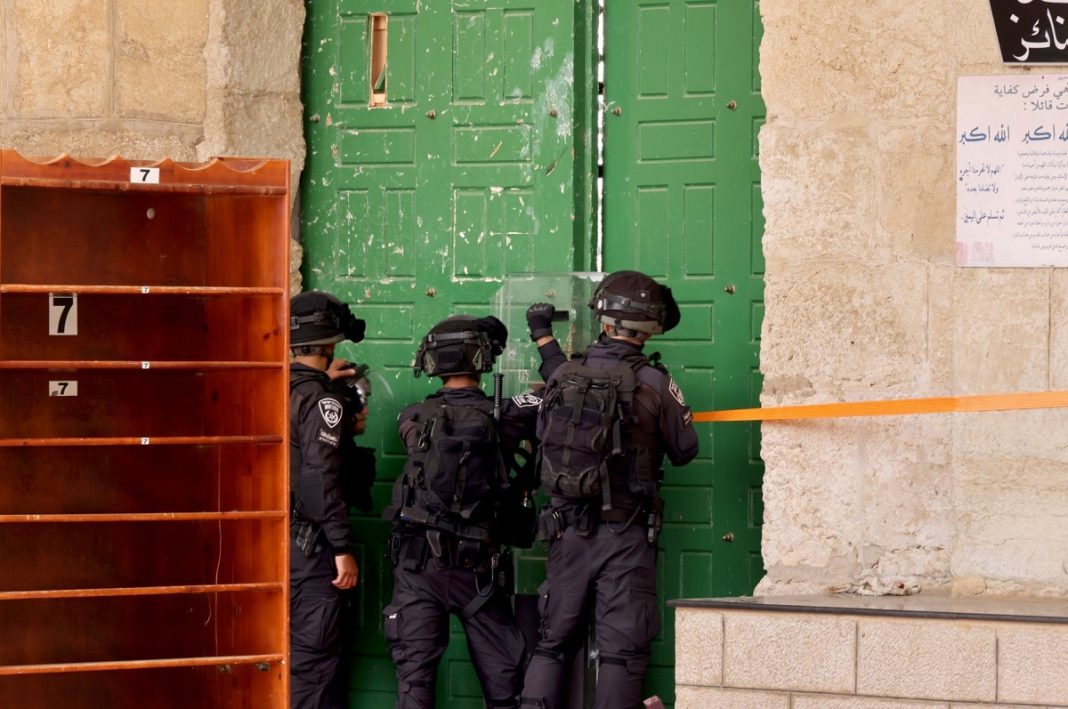Israeli Prime Minister Benjamin Netanyahu has given his approval to the recommendations of far-right Minister of National Security Itamar Ben-Gvir, despite the security agency warning that restrictions on Palestinians’ access to the Al-Aqsa Mosque during Ramadan could add fuel to the fire.
“Despite warnings from the Shin Bet (internal security agency) of potential disturbances between Palestinians inside Israel and the Israeli police, Netanyahu agreed to a recommendation from Minister of National Security Itamar Ben-Gvir to limit the access of Palestinian faithful to the Al-Aqsa Mosque during the upcoming month of Ramadan,” Channel 13 reported.
The Netanyahu administration will make an official decision on this issue in the coming days, the broadcaster claimed.
“The entry of Palestinian faithful to the Al-Aqsa Mosque during Ramadan will be limited,” the channel reported, citing unidentified sources.
Several Israeli media outlets, including Channel 12, have reported in the last two days that the Shin Bet warned the government that prohibiting Palestinians from entering the Al-Aqsa Mosque during Ramadan “could lead to major disturbances”.
The security agency warned that this decision could cause more “dangerous” disruption than the eruption of tensions in Jerusalem, the West Bank, and surrounding territories in 1948 when the State of Israel was declared.
Since the beginning of the war in the Gaza Strip, Israeli police have restricted Palestinian Muslims’ access to the Al-Aqsa Mosque, particularly on Fridays.
Last Friday, despite Israeli restrictions, approximately 25,000 Palestinian faithful were able to enter the Al-Aqsa Mosque in East Jerusalem to perform Friday prayers for the first time since the war.
This is the longest stretch of Fridays in a row that Palestinians have been barred by the Israeli authorities from offering prayers in the mosque since the start of the war on Oct. 7, an official in Jerusalem’s Islamic Endowments Department, who asked not to be named due to backlash from the Tel Aviv government, told Anadolu.
Israel has pounded the Gaza Strip since an Oct. 7 Hamas attack. The ensuing Israeli attacks have killed nearly 29,000 and caused mass destruction and shortages of necessities, while less than 1,200 Israelis are believed to have been killed in the Hamas attack.
The Israeli war on Gaza has pushed 85% of the territory’s population into internal displacement amid acute shortages of food, clean water, and medicine, while 60% of the enclave’s infrastructure has been damaged or destroyed, according to the UN.
Israel is accused of genocide at the International Court of Justice. An interim ruling in January ordered Tel Aviv to stop genocidal acts and take measures to guarantee that humanitarian assistance is provided to civilians in Gaza.
Efforts to halt Israel’s four-month-old offensive on the Gaza Strip have been expressly complicated by Israel’s plans to launch a military operation in Gaza’s southernmost city of Rafah, where around 1.5 million people have sought refuge.
Prospects for a ceasefire before Ramadan further dimmed on Sunday, as mediator Qatar announced that separate truce talks have hit an impasse, while the US said that it would veto a possible United Nations Security Council vote on a resolution next week.
In addition to the risk that restrictions on Al-Aqsa could spark unrest in the occupied West Bank – where Israel has stepped up its near daily raids since the start of the war on 7 October – an offensive on Rafah in the lead up to Ramadan could further inflame the situation.
At least 398 Palestinians have been killed by Israeli forces or settlers in the West Bank in the last four months, according to the Palestinian health ministry.
The last major Israeli offensive on Gaza was sparked by weeks of tension during Ramadan in May 2021, where hundreds of Palestinians were wounded as Israeli security forces carried out raids on Al-Aqsa Mosque.
Hamas had demanded that Israel withdraw its security forces from the complex, before launching some of its rockets from Gaza into Israel.
Israel then launched an 11-day offensive on the Gaza Strip, killing at least 260 people and causing widespread destruction in the besieged enclave.
